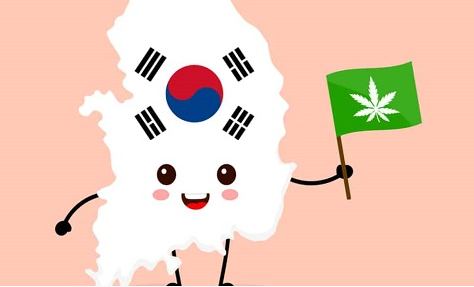South Korea Legalizes Access to Medical Marijuana
Recently, the authorities of the Republic of Korea (also known as South Korea) announced to the media the adoption of a law allowing the legalization of medical marijuana. With this move, South Korea became the first country in East Asia to implement such reforms regarding the status of marijuana, which remains strictly prohibited in all neighboring countries.
Medical marijuana became legal after the country’s legislative assembly formally approved a series of amendments to the “Act on the Control of Narcotics and Psychotropic Substances.” Specifically, the act now allows the use of the plant in doses that do not produce a noticeable intoxicating effect on the user. According to the Minister of Food and Drug Safety, the reform was adopted to give citizens access to a new treatment that has shown effectiveness in managing several chronic diseases.
Vijay Sappani, CEO of Toronto-based investment firm Ela Capital, which specializes in emerging marijuana markets, told Marijuana Business Daily that the new decision by Korean authorities has opened up a previously inaccessible region for further reforms and business growth.
“It’s hard to overstate how historic Korea’s decision is for the international movement supporting marijuana legalization,” Sappani told reporters. “Now it’s just a matter of time: I’m confident that in the coming years, other East Asian countries will adopt similar reforms, opening up what is likely the world’s largest consumer market for medical marijuana.”
Strict Control Measures
The government promises to strictly control the production, distribution, and consumption of newly legalized medical marijuana. Before receiving permission to use medical marijuana, Korean citizens must apply for a permit from the National Institute of Rare Diseases, which is responsible for researching and importing rare and expensive medications into the country. Once granted, the license can be presented to a physician to obtain a prescription for marijuana.
Despite these restrictions, Sappani and other legalization advocates agree that even this cautious approach opens up Korea and neighboring countries to the possibility of further reform.
“The main thing is that a previously closed region in East Asia is starting to open up to the idea of medical legalization. If the system proves successful, access to marijuana may become much easier, and neighboring countries may also consider using marijuana to treat chronic diseases,” he suggested.
Back in July, the Ministry of Food and Drug Safety announced its readiness to legalize cannabinoid-based medications such as Epidiolex, Marinol, Cesamet, and Sativex for the treatment of various chronic conditions, ranging from different forms of cancer and epilepsy to age-related illnesses and AIDS. These drugs are already approved and successfully used in several other countries.
Continued Strict Criminalization of Recreational Marijuana
Of course, the reforms apply only to medical marijuana. Recreational marijuana remains strictly prohibited for Korean citizens, even when they are abroad. Last month, shortly after Canada officially legalized marijuana nationwide, the South Korean embassy issued a press release stating that the country’s criminalization laws apply fully to citizens traveling overseas. As a result, being caught using marijuana recreationally can still lead to imprisonment for Korean citizens, even if the substance was consumed in a country where it is legal.
Yeon Se Jin, head of the narcotics division at the regional police department in Gyeonggi Province, told local media that national laws allow authorities to prosecute and imprison citizens who have used marijuana upon their return to Korea.
“Recreational marijuana use by Korean citizens will be prosecuted to the fullest extent of the law, even if the plant was consumed in a foreign jurisdiction where marijuana use is legal,” he told reporters. “Our laws do not provide any exceptions or leniency in this situation.”



